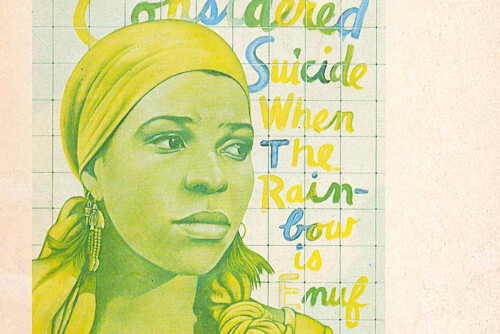“Identity Politics and the Left” 1: Eric Hobsbawm Revisited
The persistence of sexual normativity as a structuring paradigm for the left bears examination as a way into an analysis of the mainstream left’s historical disengagement with sexuality-based movements. While a complete explication of the meanings of normativity on the left is well beyond the scope of this piece, I offer a reading of Eric Hobsbawm’s 1996 essay “Identity Politics and the Left” to in order to address a fairly iconic leftist rationale for marginalizing political movements that cohere around non-normative and marginalized sexuality and sexual performance. In this piece, Hobsbawm positions non-class based movements, including sexuality-based movements, as “identitarian” and therefore not worthy of inclusion by “universalist” left movements. He writes:
“Identity groups were certainly not central to the Left. Basically, the mass social and political movements of the Left, that is, those inspired by the American and French revolutions and socialism, were indeed coalitions or group alliances, but held together not by aims that were specific to the group, but by great, universal causes through which each group believed its particular aims could be realized . . ..”
“Identity groups,” then, including racialized and ethnicized minorities, women, and LGBT groups, have particularized concerns, rather than those of the “great, universal causes.” He goes to make plain his meaning:
“So what does identity politics have to do with the Left? Let me state firmly what should not need restating. The political project of the Left is universalist: it is for all human beings. However we interpret the words, it isn’t liberty for shareholders or blacks, but for everybody. It isn’t equality for all members of the Garrick Club or the handicapped, but for everybody. It is not fraternity only for old Etonians or gays, but for everybody. And identity politics is essentially not for everybody but for the members of a specific group only. This is perfectly evident in the case of ethnic or nationalist movements. Zionist Jewish nationalism, whether we sympathize with it or not, is exclusively about Jews, and hang—or rather bomb—the rest. All nationalisms are. The nationalist claim that they are for everyone’s right to self-determination is bogus . . .. Since the 1970s there has been a tendency—an increasing tendency—to see the Left essentially as a coalition of minority groups and interests: of race, gender, sexual or other cultural preferences and lifestyles . . .. [L]et me repeat: identity groups are about themselves, for themselves, and nobody else. A coalition of such groups that is not held together by a single common set of aims or values has only an ad hoc unity, rather like states temporarily allied in war against a common enemy.” [emphases added]
Hobsbawm articulates a basic tension between Marxian movements and all other social movements, and of “identitarian” ones especially—that of the relationship between universalism and particularity. Identitarianism is merged with liberal nationalisms in his formulation. However, the italicized sentences betray more than this basic tension, because they indicate the formulation of sexuality and race that informs its inclusion in Hobsbawm’s argument. First, regarding sexuality, Hobsbawm’s offhanded comparison between “old Etonians and gays” is designed to suggest hyper-particularized absurdity, as it clearly does not indicate an actual group of gay people who attended Eton. Second, his location of identitarianism as a recent phenomenon, emerging, according to his introduction, in the “middle 1960s,” is written in the mode of criticism, rather than critique. The longue durée of the left’s universalisms emerges as the vastly more substantial and valued entity compared with formations that in 1996 were, for Hobsbawm, only a few decades old. That he mobilizes his argument by dehistoricizing identitarianism in social movements is reflected in the broad descriptive statements afforded “identity politics,” while “the Left” is afforded history. This is important, given the historical ruptures between mainstream left movements and the feminist, LGBT, caste-based, race-based, and ethnicity-based movements that inform both identitarianism and the development of social movements in relation to, or by virtue of their exclusion from, mainstream left movements. Third, the statement which prefaces Hobsbawm’s charge of an almost megalomaniacal narcissism driving identitarian movements defines sexuality as an “interest,” a “cultural preference,” and a “lifestyle.” The linguistic clues marking queer sexualities without naming them in this phrasing are unmistakable, indicating, at least, that non-normative sexuality is subject to preferences verging on whims, rather than constituting a substantial pursuit of history and politics.
In his essay in New Politics, Martin Duberman addresses Hobsbawm and his contemporaries by discussing:
“. . . a mounting attack by straight, white, and ‘liberal’ male public intellectuals on an identity politics that emphasized issues relating to race, ethnicity, gender, and sexual orientation. Among the more prominent of these intellectuals were Eric Hobsbawm, Arthur Schlesinger Jr., Ralph Nader, Richard Rorty, Jack Newfield, and Todd Gitlin. Collectively—and curiously—they chose to focus on us, rather than on corporate America (which of course they did denounce for its greed and corruption), as the chief villain in the decline of interest in the transcendent issues of class division and economic inequity. We had abandoned the working class. We had destroyed the Left.” 2
To be clear, I am not arguing, nor do I mean to imply, that Hobsbawm’s assessment can simply be explained away as “homophobia,” which is also why I include Duberman’s critique here. While homophobia may play a part in the ability to club race, gender, and sexuality together as a less worthy set of concerns than a “real” issue like class, I include this reading of Hobsbawm to suggest that his argument is representative of the analytic dismissal of sexuality, and that this is a critical social context and construct within the mainstream left. In this approach, sexuality is, perhaps, embedded within, but not constituted by, material conditions. Hobsbawm demonstrates this by reducing sexuality to gayness. He also conveys that gayness is not subject to history, by virtue of its relatively recent emergence, and that it, like so many other “identitarian” concerns, is a distraction from the task at hand. Although homophobia may be salient in formulating this argument, the question of history is the rationale on which the argument turns.
The effects of the “identitarianization” of sexuality includes the ways in which sexuality has been embedded in left critiques of “identity politics,” a term which refers to the theoretical organization of race, gender and sexuality, for example, as individual, identity-based constructs that have political valence. In the U.S., this mode of understanding race, gender, and sexuality was particularly salient during the 1990s, when Hobsbawm published this essay. (Although Marxists also speak of “class identity,” class politics were generally not part of the dominant discourse on “identity politics” in the U.S.)
In discussing Hobsbawm’s essay here, I do not mean to imply that the same rubrics are relevant today as in 1996. I do mean to draw a link between the ways in which sexuality remains embedded in left critiques of identity politics, and the impoverished critique of sexuality from the mainstream left that has resulted, alongside the ways in which queer left analysis has a wider audience within the institutions of sexuality-based struggles than the institutions of the left. There remains a need to analytically draw out each category of analysis—class, sexuality, race, gender—from the rubrics of “identity politics,” rather than aggregating together all categories of analysis that are seen to have less historicity than class. The reasons for the need to draw out sexuality are manifold, including the degrees to which the discussion on identity politics has shifted since it was the center of discourses on gender, race, and sexuality in the 1980s and 1990s. That sexuality is now being framed as an ethnicized concern in the U.S., for instance via the growing, politically produced “common sense” that queer sexualities and transgenders are the result of innate biological characteristics, has had profound impacts for political discourse, including the discourses on gay marriage and sex work described above. An aggregated view of sexuality cannot afford the textured critique of power, normativity, and the state that are needed in this political moment.
- Eric Hobsbawm. “Identity Politics and the Left.” New Left Review I.217 (May-June 1996). 25 May 2009.[↑]
- Martin Duberman. “Gay Leftie Seeks Straight Friends.” New Politics 12.1 (Summer 2008): 45. 6 Aug 2009. newpolitics.mayfirst.org/fromthearchives?nid=104.[↑]



